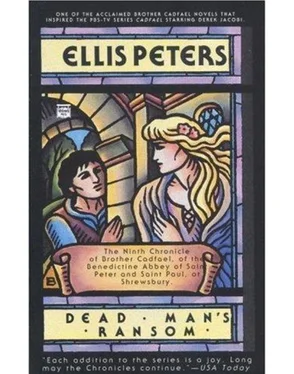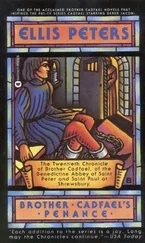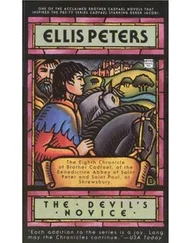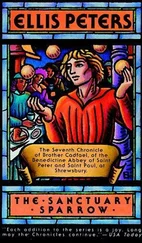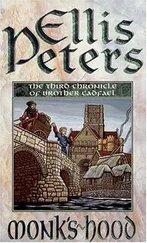Ellis Peters - Dead Man's Ransom
Здесь есть возможность читать онлайн «Ellis Peters - Dead Man's Ransom» весь текст электронной книги совершенно бесплатно (целиком полную версию без сокращений). В некоторых случаях можно слушать аудио, скачать через торрент в формате fb2 и присутствует краткое содержание. Жанр: Исторический детектив, на английском языке. Описание произведения, (предисловие) а так же отзывы посетителей доступны на портале библиотеки ЛибКат.
- Название:Dead Man's Ransom
- Автор:
- Жанр:
- Год:неизвестен
- ISBN:нет данных
- Рейтинг книги:5 / 5. Голосов: 1
-
Избранное:Добавить в избранное
- Отзывы:
-
Ваша оценка:
- 100
- 1
- 2
- 3
- 4
- 5
Dead Man's Ransom: краткое содержание, описание и аннотация
Предлагаем к чтению аннотацию, описание, краткое содержание или предисловие (зависит от того, что написал сам автор книги «Dead Man's Ransom»). Если вы не нашли необходимую информацию о книге — напишите в комментариях, мы постараемся отыскать её.
Dead Man's Ransom — читать онлайн бесплатно полную книгу (весь текст) целиком
Ниже представлен текст книги, разбитый по страницам. Система сохранения места последней прочитанной страницы, позволяет с удобством читать онлайн бесплатно книгу «Dead Man's Ransom», без необходимости каждый раз заново искать на чём Вы остановились. Поставьте закладку, и сможете в любой момент перейти на страницу, на которой закончили чтение.
Интервал:
Закладка:
Chapter Four
THE NEWS WENT ROUND IN SHREWSBURY—abbey, castle and town—almost before Cadfael had rendered account of his stewardship to Abbot Radulfus, and reported his success to Hugh. The sheriff was alive, and his return imminent, in exchange for the Welshman taken at Godric’s Ford. In her high apartments in the castle, Lady Prestcote brightened and grew buoyant with relief. Hugh rejoiced not only in having found and recovered his chief, but also in the prospect of a closer alliance with Owain Gwynedd, whose help in the north of the shire, if ever Ranulf of Chester did decide to attack, might very well turn the tide. The provost and guildsmen of the town, in general, were well pleased. Prestcote was a man who did not encourage close friendships, but Shrewsbury had found him a just and well-intentioned officer of the crown, if heavy-handed at times, and was well aware that it might have fared very much worse. Not everyone, however, felt the same simple pleasure. Even just men make enemies.
Cadfael returned to his proper duties well content, and having reviewed Brother Oswin’s stewardship in the herbarium and found everything in good order, his next charge was to visit the infirmary and replenish the medicine-cupboard there.
“No new invalids since I left?”
“None. And two have gone out, back to the dortoir, Brother Adam and Brother Everard. Strong constitutions they have, both, in spite of age, and it was no worse than a chest cold, and has cleared up well. Come and see how they all progress. If only we could send out Brother Maurice with the same satisfaction as those two,” said Edmund sadly. “He’s eight years younger, strong and able, and barely sixty. If only he was as sound in mind as in body! But I doubt we’ll never dare let him loose. It’s the bent his madness has taken. Shame that after a blameless life of devotion he now remembers only his grudges, and seems to have no love for any man. Great age is no blessing, Cadfael, when the body’s strength outlives the mind.”
“How do his neighbours bear with him?” asked Cadfael with sympathy.
“With Christian patience! And they need it. He fancies now that every man is plotting some harm against him. And says so, outright, besides any real and ancient wrongs he’s kept in mind all too clearly.” They came into the big, bare room where the beds were laid, handy to the private chapel where the infirm might repair for the offices. Those who could rise to enjoy the brighter part of the day sat by a large log fire, warming their ancient bones and talking by fits and starts, as they waited for the next meal, the next office or the next diversion. Only Brother Rhys was confined to his bed, though most of those within here were aged, and spent much time there. A generation of brothers admitted in the splendid enthusiasm of an abbey’s founding also comes to senility together, yielding place to the younger postulants admitted by ones and twos after the engendering wave. Never again, thought Cadfael, moving among them, would a whole chapter of the abbey’s history remove thus into retirement and decay. From this time on they would come one by one, and be afforded each a death-bed reverently attended, single and in solitary dignity. Here were four or five who would depart almost together, leaving even their attendant brothers very weary, and the world indifferent.
Brother Maurice sat installed by the fire, a tall, gaunt, waxen, white old man of elongated patrician face and irascible manner. He came of a noble house, an oblate since his youth, and had been removed here some two years previously, when after a trivial dispute he had suddenly called out Prior Robert in a duel to the death, and utterly refused to be distracted or reconciled. In his more placid moments he was gracious, accommodating and courteous, but touch him in his pride of family and honour and he was an implacable enemy. Here in his old age he called up from the past, vivid as when they happened, every affront to his line, every lawsuit waged against them, back to his own birth and beyond, and brooded over every one that had gone unrevenged.
It was a mistake, perhaps, to ask him how he did, but his enthroned hauteur seemed to demand it. He raised his narrow hawk, nose, and tightened his bluish lips. “None the better for what I hear, if it be true. They’re saying that Gilbert Prestcote is alive and will soon be returning here. Is that truth?”
“It is,” said Cadfael. “Owain Gwynedd is sending him home in exchange for the Welshman captured in the Long Forest a while since. And why should you be none the better for good news of a decent Christian man?”
“I had thought justice had been done,” said Maurice loftily, “after all too long a time. But however long, divine justice should not fail in the end. Yet once again it has glanced aside and spared the malefactor.” The glitter of his eyes was grey as steel.
“You’d best leave divine justice to its own business,” said Cadfael mildly, “for it needs no help from us. And I asked you how you did, my friend, so never put me off with others. How is it with that chest of yours, this wintry weather? Shall I bring you a cordial to warm you?” It was no great labour to distract him, for though he was no complainer as to his health, he was open to the flattery of concerned attention and enjoyed being cosseted. They left him soothed and complacent, and went out to the porch very thoughtful.
“I knew he had these hooks in him,” said Cadfael when the door was closed between, “but not that he had such a barb from the Prestcote family. What is it he holds against the sheriff?”
Edmund shrugged, and drew resigned breath. “It was in his father’s time, Maurice was scarcely born! There was a lawsuit over a piece of land and long arguments either side, and it went Prestcote’s way. For all I know, as sound a judgement as ever was made, and Maurice was in his cradle, and Gilbert’s father, good God, was barely a man, but here the poor ancient has dredged it up as a mortal wrong. And it is but one among a dozen he keeps burnished in his memory, and wants blood for them all. Will you believe it, he has never set eyes on the sheriff? Can you hate a man you’ve never seen or spoken to, because his grandsire beat your father at a suit at law? Why should old age lose everything but the all-present evil?”
A hard question. And yet sometimes it went the opposite way, kept the good, and let all the malice and spite be washed away. And why one old man should be visited by such grace, and another by so heavy a curse, Cadfael could not fathom. Surely a balance must be restored elsewhere.
“Not everyone, I know,” said Cadfael ruefully, “loves Gilbert Prestcote. Good men can make as devoted enemies as bad men. And his handling of law has not always been light or merciful, though it never was corrupt or cruel.”
“There’s one here has somewhat better cause than Maurice to bear him a grudge,” said Edmund. “I am sure you know Anion’s history as well as I do. He’s on crutches, as you’ll have seen before you left us on this journey, and getting on well, and we like him to go forth when there’s no frost and the ground’s firm and dry, but he’s still bedded with us, within there. He says nothing, while Maurice says too much, but you’re Welsh, and you know how a Welshman keeps his counsel. And one like Anion, half-Welsh, half-English, how do you read such a one?”
“As best you can,” agreed Cadfael, “bearing in mind both are humankind.” He knew the man Anion, though he had never been brought close to him, since Anion was a lay servant among the livestock, and had been brought into the infirmary in late autumn from one of the abbey granges, with a broken leg that was slow to knit. He was no novelty in the district about Shrewsbury, offspring of a brief union between a Welsh wool-trader and an English maid-servant. And like many another of his kind, he had kept touch with his kin across the border, where his father had a proper wife, and had given her a legitimate son no long time after Anion was conceived.
Читать дальшеИнтервал:
Закладка:
Похожие книги на «Dead Man's Ransom»
Представляем Вашему вниманию похожие книги на «Dead Man's Ransom» списком для выбора. Мы отобрали схожую по названию и смыслу литературу в надежде предоставить читателям больше вариантов отыскать новые, интересные, ещё непрочитанные произведения.
Обсуждение, отзывы о книге «Dead Man's Ransom» и просто собственные мнения читателей. Оставьте ваши комментарии, напишите, что Вы думаете о произведении, его смысле или главных героях. Укажите что конкретно понравилось, а что нет, и почему Вы так считаете.
